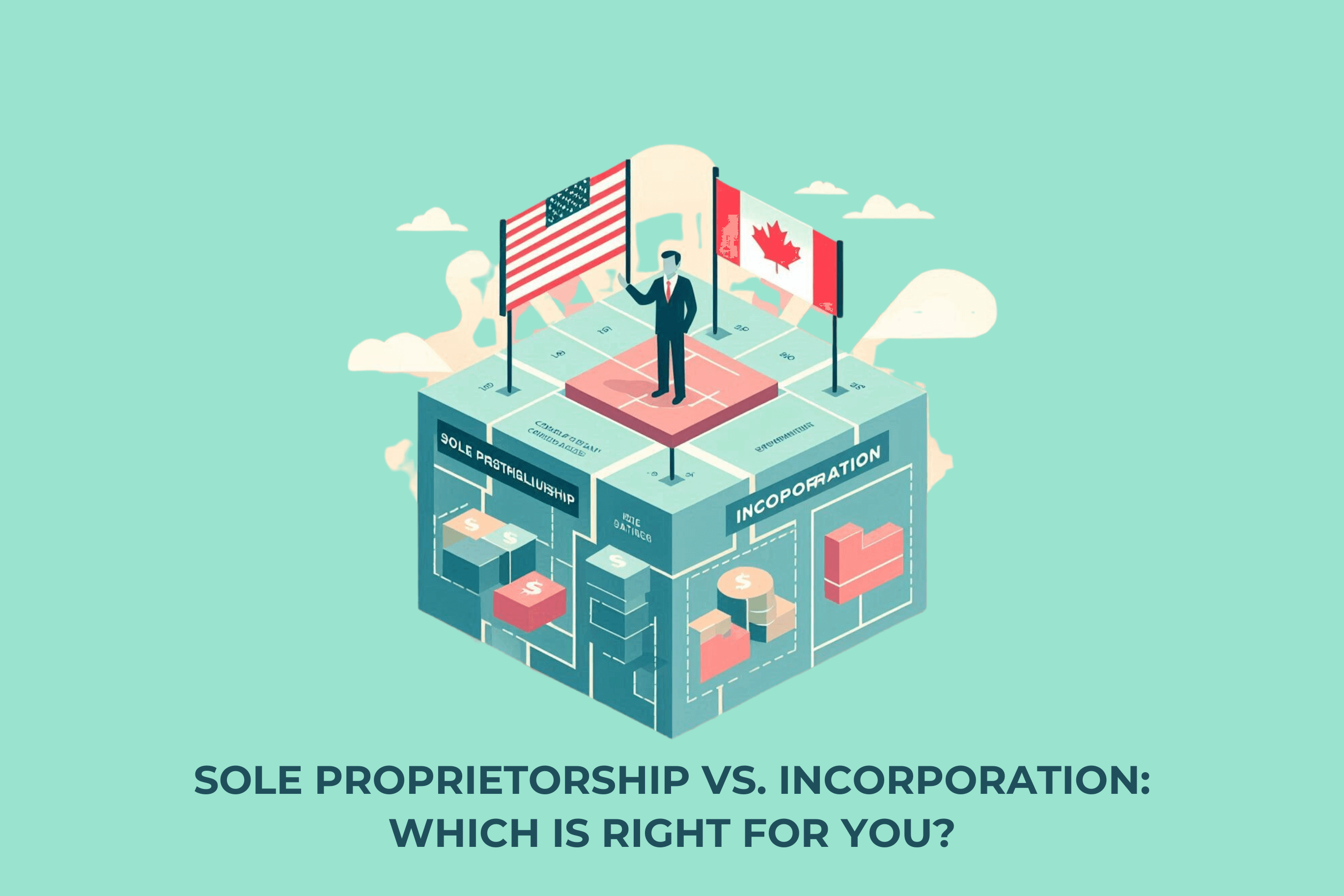
Sole Proprietorship vs. Incorporation: Which Is Right for You?
Introduction
It looks very hard to decide
between sole proprietorship and incorporation especially when you see the
advantages and disadvantages of both aspects. Because the decision affects the
future of your business from liability to tax planning, in this blog, we look
inside both aspects to understand which choice could be good for your business.
Key takeaways:
|
Feature |
||
|
Definition |
Single-owner business entity |
Separate legal entity from its owners |
|
Setup Complexity |
Simple and inexpensive to establish |
More complex and costly to set up |
|
Liability |
Unlimited personal liability |
Limited liability for shareholders |
|
Taxation |
Income taxed as personal income |
Potential tax benefits and deductions |
|
Control |
Full control by the owner |
Control divided among shareholders |
|
Capital |
Limited to personal resources |
Easier to raise capital through investors |
|
Reliability |
Often perceived as less professional |
Generally seen as more reliable |
|
Administrative Burden |
Lower paperwork and compliance |
Higher regulatory requirements and costs |
Sole Proprietorship: Simple but
Risky
A sole proprietorship is simple
and easy to manage. However, there is a personal burden for business bills. Business
owners will be responsible for any financial declines. This liability can affect business as well as
personal assets.
Advantages:
1.
Ease of Formation:
o
Sole
proprietorship is an easy startup where you do not need a lot of paperwork or need
to consider forms.
o
Example:
You want to sell homemade cupcakes. You just start baking, decorating, and
selling them. It is not complicated.
2.
Complete Control:
o
You
can make all the decisions for your business. It is like a team leader or
captain of a ship.
o
Example:
You are free to decide the flavors and decoration of your cupcakes.
3.
Direct Profit Enjoyment:
o
All
the money you earn belongs to you. You get to keep every dollar!
o
Example:
If your dog-walking business earns $50, that is your money to spend.
4.
Simplified Tax Filing:
o
Tax
filing becomes easier as you register business income on your personal tax
return.
o
Example:
You tell the government that you made $70 from your baked cupcakes.
5.
Fewer Compliance Burdens:
o
No
expensive corporate meetings or paperwork. You are free to focus on your
business.
o
Example:
No need for board meetings—you are the boss, after all!
Disadvantages:
1.
Unlimited Personal Liability:
o
If
your business loses money or gets into trouble, your own stuff (like your bike
or video games) could be at risk.
o
Example:
Imagine your lemonade stand accidentally spills lemonade on someone’s phone.
You might have to pay for it!
2.
Business Downturns:
o
When
your business faces decline, you feel the direct impact. It is like driving a
two-wheeler without a helmet.
o
Example:
If your dog-walking business loses customers, you might earn less money.
Incorporation: Future-Proofing
Your Business
Incorporation provides other
benefits such as limited liability, tax advantages, and business reputation.
Incorporation is a little more complex. It defends personal assets and allows
for strategic tax planning.
Advantages:
1. Limited Liability:
o
Your
personal stuff is safe! If your business owes money, your personal belongings are
outlawed.
o
Example:
Even if your toy store business goes bankrupt, your personal savings are
protected.
2. Potential Tax Planning:
o
You
can play smart with taxes. It is like having secret codes to save money!
o
Example:
If your candy shop makes lots of money, you can split it between family members
to pay less tax.
3. Protected Business Name:
o
Your
company name is like a superhero identity. No one other can use the same
identity. This makes it more professional and trustworthy.
o
Example:
Your comic book store can be called “Super Comics” without anyone else using
that name.
4. Easier Ownership Transfer:
o
If
you want to sell your business, It is like handing over a specific duty or
responsibility.
o
Example:
You can sell part of your business/ share (like pieces of a pastry) to someone
who wants to run your bakery shop.
Disadvantages:
1. Complex Formation:
o
Incorporating
means more paperwork. It’s like assembling a giant puzzle.
o
Example:
You need legal documents, signatures, and official approvals to create your
company.
2. Corporate Governance:
o
You
have rules to follow, like a game with lots of levels. Board meetings and
reports are part of the game.
o
Example:
Imagine your video game store has a board meeting to decide which games to
stock.
3. Higher Costs:
o
Incorporating
isn’t free. It’s like paying for a deluxe ticket to a theme park.
o
Example:
You’ll need money for legal fees and other setup expenses.
Here is a quick overview:
|
Aspect |
||
|
Advantages |
Ease of
formation and dissolution Complete control Direct profit
enjoyment Simplified tax
filing Fewer compliance
burdens |
Limited liability Potential tax
planning Protected
business name Easier ownership
transfer |
|
Disadvantages |
Unlimited
personal liability Business
downturn impact |
Complex
formation process Corporate
governance requirements Higher costs |
Conclusion
Consider your long-term vision,
risk tolerance, and growth plans. Whether you choose simplicity or potential,
make an informed decision that aligns with your business aspirations.
Remember, you are not alone on
this journey—your Professional Advisor can guide you through the layers of choice
and opportunity.
ASAN Can Help
Empower your financial future with ASAN's expert guidance on Canadian & US Taxation. We strive to align investments with your goals for true financial freedom.
Ready to take the next step?
Contact Us
📞 Phone: +1(613)-981-7097
🌐 Website: asangroupinc.com
Disclaimer:
The information provided in this blog is intended for general guidance and informational purposes only and should not be considered as professional accounting, audit, or assurance advice. Please consult with a certified professional for specific advice tailored to your situation.

